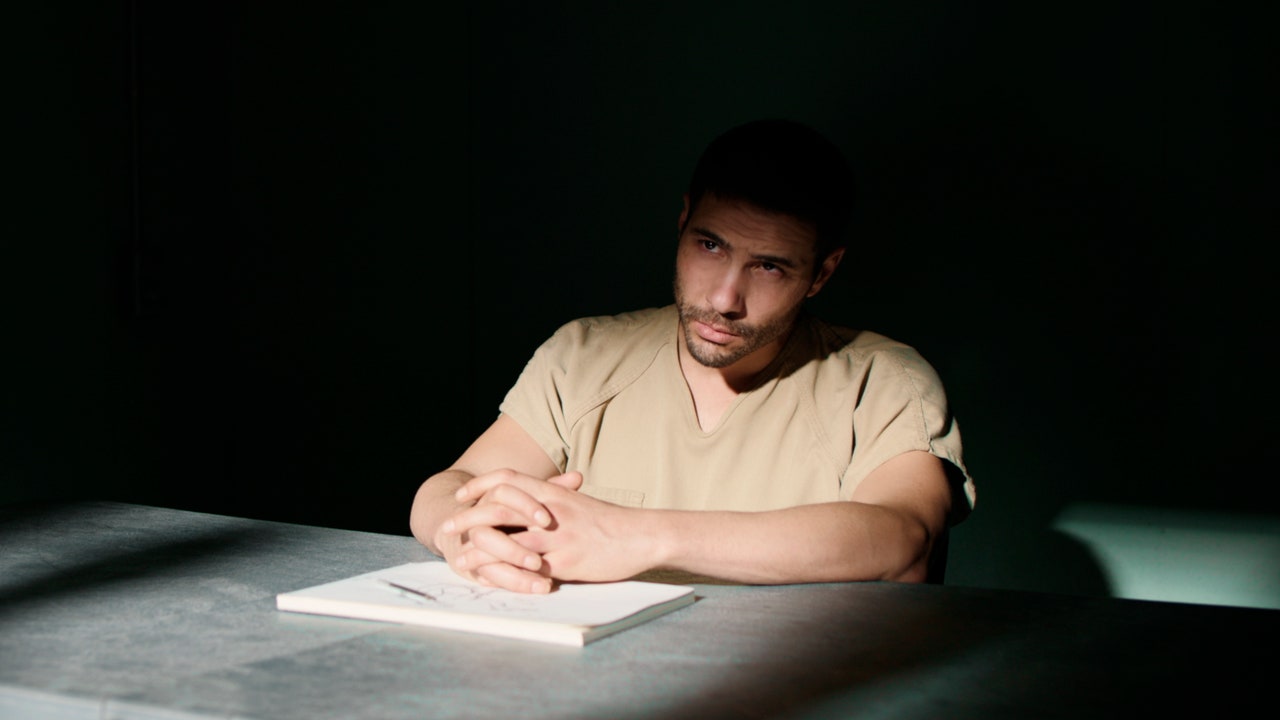[vc_row][vc_column][vc_single_image image=”116366″ img_size=”full” add_caption=”yes”][vc_column_text]West Wing writer Aaron Sorkin has taken another foray into the world of American politics with The Trial of the Chicago 7, starring Sacha Baron Cohen, Eddie Redmayne and Mark Rylance. The film delves into the trial of seven activists arrested for inciting violence during clashes with police that resulted from protests against the Vietnam War at the 1968 Democratic National Convention; it is a reminder of the importance of a fair trial.
Similar in tone, then, to BAFTA’s best film nominee The Mauritanian (pictured above) and the story of Mohamedou Ould Salahi.
Salahi was imprisoned in Guantanamo Bay due to perceived connections with terrorist group al-Qaeda for more than 14 years without charge until his eventual release in 2016.
In 2005, Salahi wrote a memoir that was eventually published in 2015 with numerous redactions and is the basis of the film.
Forty prisoners still remain at the camp and most have not been charged or tried with any crime. Despite this, as the film shows, legal challenges are deliberately stifled for political purposes.
President Joe Biden has committed to close the camp by the time he leaves office.
There are several recent documentaries that celebrate the crucial work of investigative journalists.
Collective is remarkable film about corruption and political cover-up at the heart of Romanian institutions.
In 2015, a fire broke out at Colectiv night club in Bucharest, resulting in the deaths of 64 people. Hospitals were overwhelmed by the casualties and the deaths of 13 of the victims were attributed to bacterial infections that arose from being treated with watered down disinfectant used to save money. The story would have been forgotten had it not been for the tireless work of a daily sports newspaper. The ordeal exposed corruption and corner-cutting that fuelled anger on the streets of Romania. Protests eventually led to the resignation of Prime Minister Victor Ponta.
During the film, lead investigator for the paper Catalin Tolontan says of the situation: “When the press bows down to authorities, the authorities will mistreat the citizens.”
Collective is an insight into how teams of journalists break such stories
Athlete A is another testament to the power of investigative journalism.
Over recent years, numerous scandals have revealed the toxic atmospheres of some elite sports teams. None more so, perhaps, than the sexual abuse of US gymnasts shown in Athlete A. The Indianapolis Star helped uncover victims’ stories of sexual abuse by USA team gymnastics doctor Larry Nassar, who was found to have assaulted at least 265 girls over a period of two decades. The film’s title refers to Maggie Nichols, the gymnast who reported her experiences in 2015, only to be dropped from the 2016 Olympics team shortly after.
Collective and Athlete A highlight the lengths governments and organisations will go to keep quiet such scandals.
More extreme examples can lead to deaths, such as the brutal killing of Jamal Khashoggi, investigated in The Dissident.
Khashoggi was a US-based journalist and columnist for the Washington Post and was murdered inside the Saudi Arabian consulate in Istanbul, Turkey. The CIA eventually determined the killing was premeditated and ordered by Crown Prince Mohammed bin Salman.
After its release in January 2020, producer Thor Halvorssen alleged there were attempts by “Saudi-backed trolls” to reduce its score on film-rating sites IMDB and Rotten Tomatoes to below 70 per cent.
“The moment you drop under 70 per cent, your film is essentially dead,” Halvorsson told Variety at the time. “People who follow individual critics will watch it; but the regular public will not.”
Public pressure that arises as a result of the revelations of the press are important, democratic displays of dissent. Their value is emphasised when authorities try to take away such expression.
Protests over a proposed extradition law allowing people in Hong Kong to be sent for trial in mainland China began in 2019. The law was met with such hostility by people in Hong Kong, that China eventually brought in the controversial National Security Law, criminalising any act of secession, subversion, terrorism, and collusion with external forces.
The citizens of Hong Kong have suffered under the law, as have the press. On 6 January, 53 pro-democracy activists were arrested by Chinese authorities.
Do Not Split – which takes its name from a Cantonese phrase which translates loosely as “Do not split, do not divide, do not snitch on others” – follows the course of the early protests up to the imposition of the law that now threatens freedom in Hong Kong.[/vc_column_text][/vc_column][/vc_row][vc_row][vc_column][three_column_post title=”You may also want to read” category_id=”581″][/vc_column][/vc_row]





